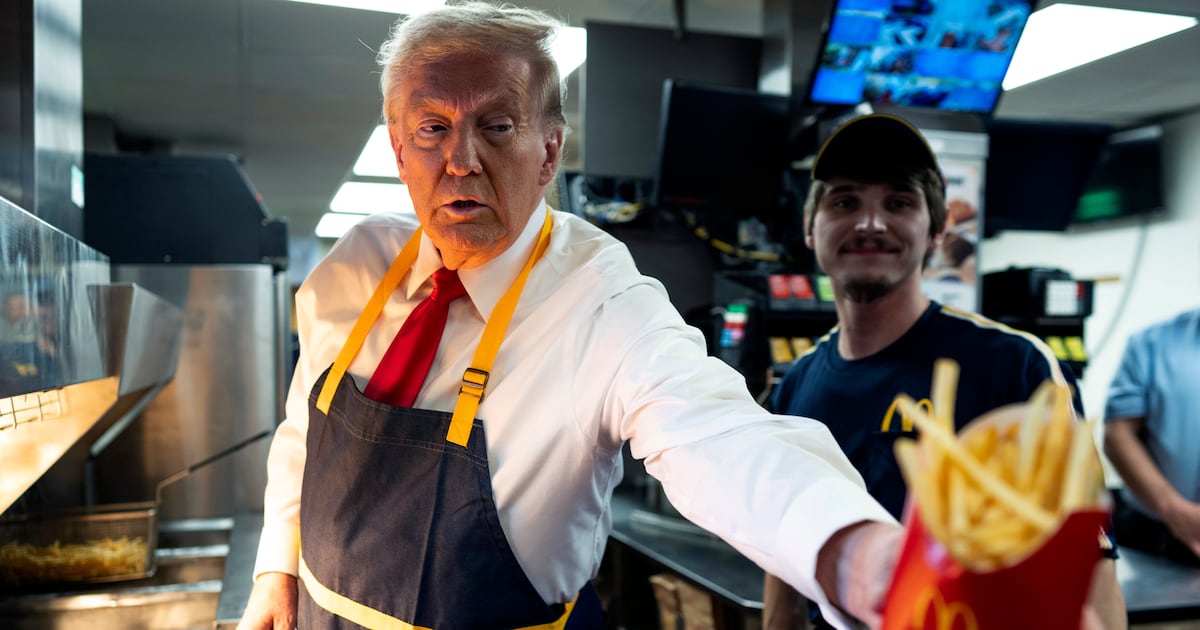Ever since Netflix dropped Squid Game—a gory and grim commentary on capitalism—the South Korean dystopian thriller is just about all anyone can talk about. Already, it’s on track to become the streaming service’s most-watched original show to date, nabbing the title from its polar opposite: Shonda Rhimes’ dainty and romantic Bridgerton.
The gripping nine-episode series follows desperate, debt-riddled contestants who choose to play children’s games to the death in the slim chance they’ll leave alive and with a portion of the 45.6 billion South Korean won ($38.5 million) prize money.
If anything can speak to the cultural frenzy over the show, Amazon sellers are already hawking Squid Game-inspired Halloween costumes. Beauty influencers have whipped up makeup tutorials on how to copy Kang Sae-byeok’s (Jung Ho-yeon) freckles. Vulture cleverly nabbed an interview with the creepy, giant porcelain doll that helps execute players who mistakenly wobble while playing red light, green light. And there’ve been about a dozen pieces about what the show says about our capitalist society and humanity.
But now fresh discourse has entered the chat: Did Netflix botch some of the dialogue with its translated subtitles and closed captions?
The discussion was sparked after the first wave of viewers had finished binging the series. Korean-speakers pointed out that there were a few discrepancies in the translations that spoke to the cultural nuances threaded throughout the show. (There has been clarification that the English subtitles are significantly more accurate than the closed captions.)
For example, when crafty Han Mi-nyeo (played by Kim Joo-ryoung) sees her short-lived alliance with the brute gangster Jang Deok-su (Heo Sung-tae) fall apart, she attempts to persuade other players to choose her as their teammate. The closed caption has her saying, “I’m not a genius, but I still got it work[ed] out.” Meanwhile, the subtitled version reads, “I never bothered to study, but I’m unbelievably smart.”
This is the first example of some of the inconsistencies pointed out by comedian Youngmi Mayer, whose initial video about the differences has since gone viral. Mayer said a better translation would be along the lines of: “I’m very smart, but I never had the chance to study,” which is more akin to the subtitled version. Mayer explained in the TikTok that a common trope in Korean media is of a person who is smart but just isn’t wealthy, which speaks to Han’s role in the show.
Another missed mark came with the relationship between immigrant worker Ali (Anupam Tripathi) and university-educated Cho Sang-woo (Park Hae-soo). Ali continually refers to Cho in a formal manner, calling him “sir” in the translated version. The Korean word used is “seonsaengnim,” which better translates to “superior.” But as the men grow closer, Cho tells Ali to refer to him as “hyung” which means “older brother,” to indicate their friendship.
In Korean culture, a large emphasis is placed on hierarchy, and honorific titles are used to indicate someone’s status—to show someone their due level of respect, or indicate familiarity with someone. Using that specific honorific title makes it all the more heartbreaking in the final scene between the two men when Ali calls out “hyung” to Cho, even when it begins to dawn on him that he’s just betrayed him.
Of course, there might not be a perfect translation for every expression across different languages, nor is there a way to add such footnotes to episodes in order to give non-Koreans insight into some of the cultural nuances. But the consistent minor discrepancies raise the question: Is it possible to accurately translate an inherently Korean show for a global audience without losing the hallmarks of what made it so special?
Overall, the inconsistencies in the subtitles and closed captioning aren’t overly egregious, according to three Korean-speakers The Daily Beast spoke with, who all say the subtitles are much more accurate than the closed captions. Still, they admit the translations could use some improvement. (The Daily Beast reached out to Netflix for comment.)
T.K., who runs the popular blog Ask a Korean, says he doesn’t think the discrepancies destroy the overall meaning of the show for non-Korean-speakers, estimating it takes away around 5-10 percent of the total enjoyment. “Nothing so far has been completely wrong, just on the edges,” he explains, clarifying that he’s only seen up to the sixth episode so far.
It was seeing the discourse online that spurred T.K. to go through the episodes carefully himself. The first episode’s translated subtitles, he noted, were fantastic, but admits the quality dropped slightly in the second episode, mainly with a missed play on words that repeat the episode’s title, “Hell.”
The oldest player in the game, Oh Il-nam (Oh Young-soo) is speaking with Seong Gi-hun (Lee Jung-jae) after the majority voted to leave the game following the red light, green light massacre. While discussing life outside of the game and the troubles they face in the real world, Seong is translated as saying, “Out here, the torture is worse.” But T.K. says a more accurate translation would be, “Out here is more of a hell.”
By the third episode, T.K. says the translation quality “dropped like a rock” and in episode four, the translations were changing nuances in the Korean language, but there was still nothing egregiously wrong.
Sean agrees that the inconsistencies with the dialogue and subtitles were noticeable throughout the series.“I get that some things are culturally difficult to explain and understand, but there are times when I feel they could have done a better job without exerting too much more effort,” he says, using Parasite, the Korean-language thriller that won Best Picture at the 2020 Oscars, as an example of a near-perfect translation.
Still, while there are some inconsistencies and improvements that could be made to the translated subtitles and closed captioning, T.K. says he believes it really should boil down to making sure the viewer understands the overall message.
“I am a big believer in translating emotions rather than words,” he says. “The ultimate goal of a translator should be to have the text ‘land’ the same way, not just translate word-for-word.”
Using the first episode “Red Light, Green Light” as an example, T.K. says it didn’t really bother him that the translators used the English term for the first game that all the contestants played.

In Korean, the game’s rough translation is “Hibiscus flower has bloomed,” which is what the terrifying doll says before her head whips around to detect which player is still moving. It’s essentially the same game as red light, green light—just a different phrase, but one English speakers can recognize easily.
“The whole idea of Squid Game turns on how messed up it is to bet your life on playing children’s games,” T.K. says. “So, the concept of a children’s game needs to land strongly, and for English-speakers, it means the translated word needs to be something they immediately recognize as a children’s game on a gut level.”
But another Korean-speaker disagrees slightly. Crediting Squid Game creator-director Hwang Dong-hyuk’s exceptional writing and storytelling, with poignant metaphors sprinkled throughout the series, they believe there should be more importance placed on maintaining the integrity of the dialogue and the script’s writing.
In the same way that they look up some references that they don’t fully understand in English shows, they believe more people could do that for Squid Game when it uses a direct reference to a Korean phrase.
“I feel like people watching the show can understand that there is such depth in the writing,” they explain, “They [could] end up Googling it because everyone just watches TV with their phone in their hands.”
Still, they concede, “I know that translation is extremely difficult and there’s all these things that you have to take into account, [so] I understand that you can’t really add a bunch of footnotes.”
The show’s massive success presents Netflix with a good learning opportunity for when a foreign-language series or film becomes a hit internationally. In the case of Squid Game, a behind-the-episode look at moments that might have been missed by non-native speakers would have gone a long way toward breaking down elements of the dialogue or better explaining elements of Korean culture.
But overall, there are no glaring factual errors with the translated subtitles. Non-Korean-speakers aren’t missing out on too much detail, and it shouldn’t be a deterrent from watching. To those who’ve claimed the inconsistencies put them off for good, T.K. says relax.
“Get over it,” he says. “Nothing was so disastrously wrong that it made the entire thing misleading. If missing nuances bothers you so much, learn Korean.”







